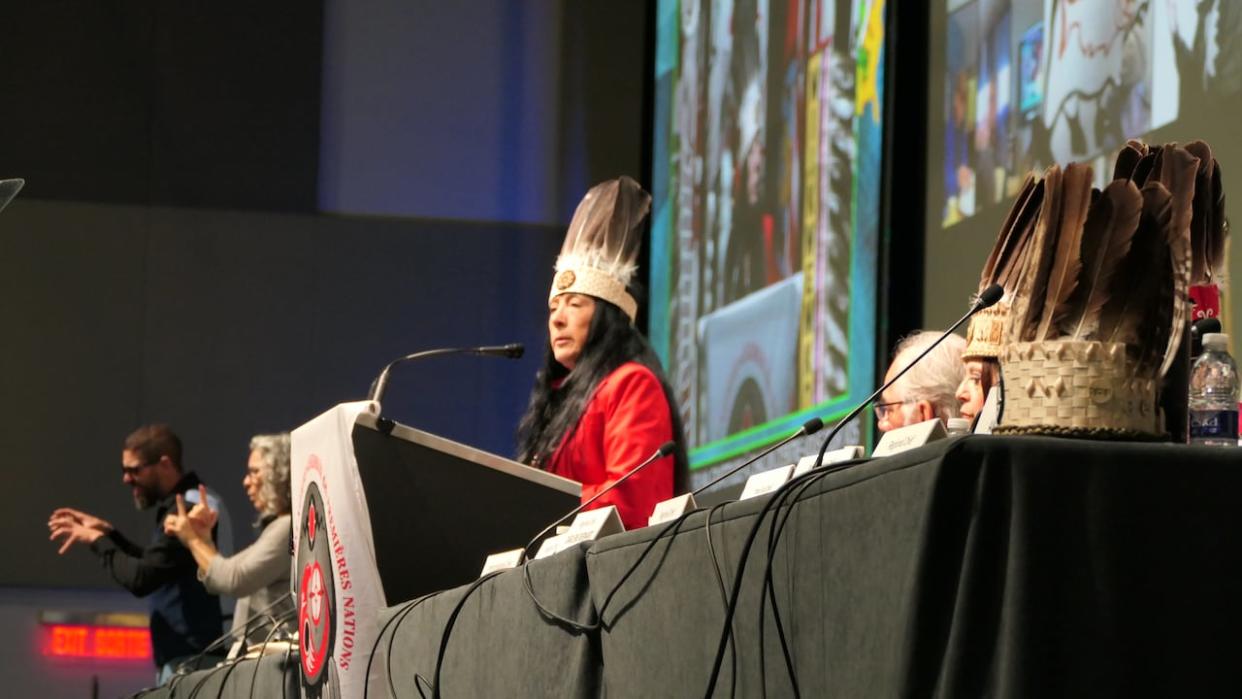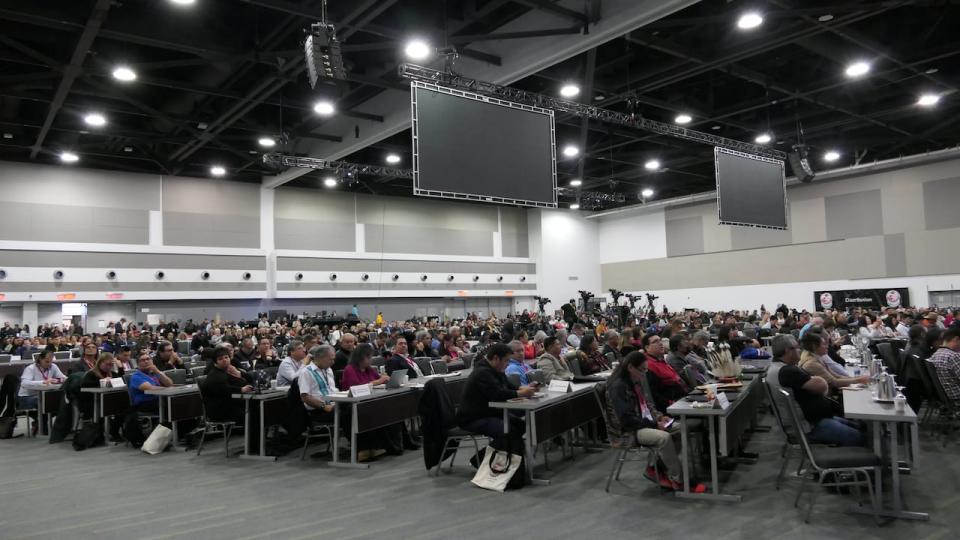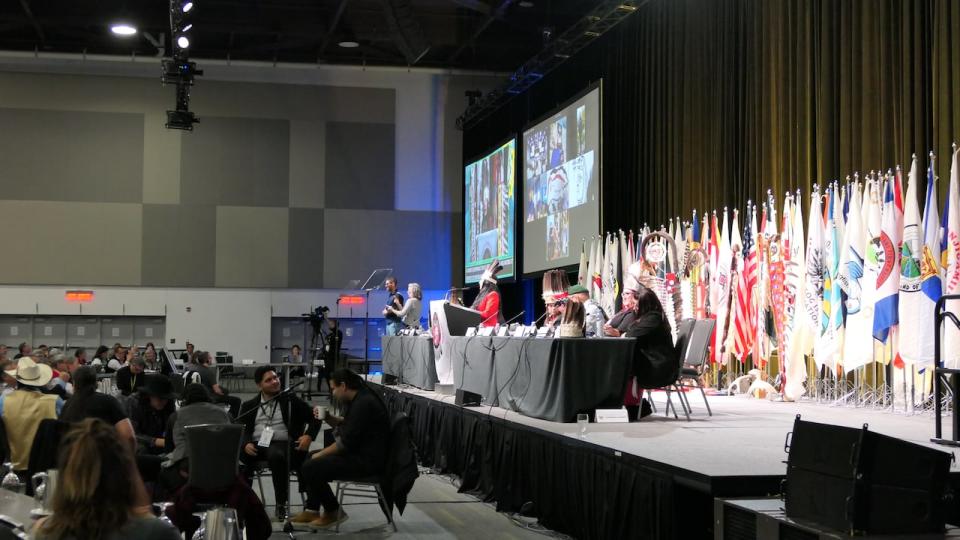Chiefs seek unity as a fractured Assembly of First Nations elects new leader

First Nations leaders gathering in Ottawa this week to elect a new national chief say the top issue facing the Assembly of First Nations (AFN) is the need to unify a fractured organization following years of turmoil, either by reform or returning to the foundation on which the AFN was built.
Among the delegates milling about the convention centre or shuffling in and out of campaign rooms at the Westin Hotel, one theme — the need for unity — recurs.
"Right now, we're divided," said Chief Jamie Wolfe of Muskowekwan First Nation in Saskatchewan as he stood outside the convention centre, where debate over chiefs resolutions was getting heated.
"And that's not well, when you're First Nations and you're all fighting amongst each other."
The AFN is a national advocacy organization for more than 630 communities across the country. The AFN estimated 400 chiefs and proxies had registered to vote by Tuesday.
RoseAnne Archibald, elected in 2021, was the AFN's first woman national chief and became the first national chief officially voted out of office in July this year.
Those vying to replace her are Reginald Bellerose, Craig Makinaw, Sheila North (Wikahsko Iskwew), David Pratt, Dean Sayers and Cindy Woodhouse. The winner must secure 60 per cent support from those registered to vote.
'We don't have a lot of confidence'
Wolfe is backing his community's former chief, Bellerose, the runner up in 2021, saying Bellerose's 17 years as chief of Muskowekwan show he could advance the assembly on substantive issues.
"He drove our nation forward when it comes to economic development, child welfare, education, health and social development," said Wolfe.
Tara Cutarm, a member of Ermineskin Cree Nation in Alberta, is working to see Makinaw elected. Makinaw is a former chief of the community and former AFN regional chief for Alberta.
"He knocks at those doors. He's at those tables," she said.
"Where other nations don't have the ability to do that, he speaks up and he stands up and advocates for them."
Like others, Cutarm believes the top issue facing the assembly is the lack of enthusiasm among its own members.
Ouray Crowfoot, chief of Siksika Nation in Alberta, is looking for someone to fix the AFN's foundational issues. He is endorsing North, who is from Bunibonibee Cree Nation in Manitoba.
"We don't have a lot of confidence and faith in the way the AFN is currently operating, and we don't feel it really represents us," said Crowfoot.
His First Nation is one of the largest in Canada by land and population, he said, which is why he wants to see the AFN's one-chief, one-vote system overhauled. The system gives chiefs from tiny communities equal say as large ones, which he believes is inequitable.
"If you have equitable representation, I think the AFN can be a formidable force again, and you'll get that buy-in," he said.

Delegates gather at Ottawa's Shaw Centre for the AFN special chiefs assembly and national chief election. An estimated 400 chiefs and proxies were registered to vote on Tuesday. (Fenn Mayes/CBC)
Rudy Turtle, chief of Grassy Narrows First Nation in Ontario, is leaning toward Pratt, first vice-chief of the Federation of Sovereign Indigenous Nations in Saskatchewan, and Sayers, the longtime chief of Batchewana First Nation in Ontario.
Turtle intends to vote for someone who will stand behind First Nations in his area who oppose mining and industrial development on their land.
"We're very concerned about the environment. I think that's our top priority, but also probably housing and social issues," Turtle said.
He doesn't believe the AFN is living up to the hopes First Nations had for it when it was founded in 1968 to resist Pierre Trudeau's infamous White Paper policy plan, which aimed to assimilate First Nations into mainstream Canadian society.
"I would like to see them go back to political advocacy and speaking up for our people, especially when it comes to defending our rights," he said.
Tight race predicted
Lynn Acoose, chief of Zagime Anishinabek in Saskatchewan, is supporting Sayers because of his past work on the AFN's charter renewal committee, which is tasked with completing the financial review Archibald demanded.
"The grassroots people are always asking for transparency," Acoose said.
Dylan Whiteduck, chief of Kitigan Zibi Anishinabeg in Quebec, said he and his council read all the campaign documents and decided Woodhouse had the strongest platform, but with no clear front runner, he is predicting a tight race.
"I'm not saying that she's a shoo-in to win. She is a strong candidate and there's other strong candidates as well," he said.
"I think we're going to be stuck with three people at the very end and we're going to have to figure it out."

Interim National Chief Joanna Bernard speaks at the Assembly of First Nations special chiefs assembly Tuesday. (Fenn Mayes/CBC)
Lance Copegog, a member of the youth council for the Anishinabek Nation advocacy organization in Ontario, believes recent events have rightfully raised questions about the assembly but he sees a chance to show youth and grassroots people the organization actually matters.
"Today's youth leaders are vocal, and the AFN must work with them to match the progress," said Copegog, who is from Beausoleil First Nation in Ontario.
"There's a lot of work that needs to be done to rebuild trust and demonstrate that the AFN has a role to play in the lives of First Nations people."
Voting is scheduled to begin on Wednesday.

